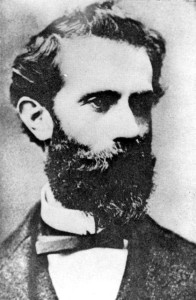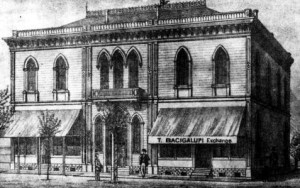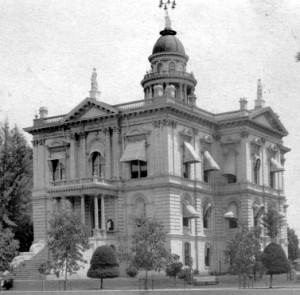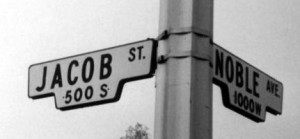Elias Jacob
Values Codes I – E – L – P
Elias Jacob was born in Germany in 1841, where his father was a merchant.
He made his way to California in 1852, when he was only 12 years old, and went to work at a relative’s store in Stockton, California.
Along the way
In 1856, Elias Jacob was working at Millerton, California, and in 1859 came to Visalia, which was rapidly becoming the trading center for the lower San Joaquin Valley.
His sister, Susie Jacob, married Hyman Mitchell in Stockton.
When Susie died, Hyman married her sister, Dora Jacob.
Visalia
Hyman Mitchell died suddenly in 1859, leaving Elias Jacob to manage his business for his sister.
From 1860 to 1876, Elias Jacob had his own merchandising businesses in Visalia, with other stores in surrounding areas.
At one time, his nephew, Michael Mitchell, was a partner.
During the 1870’s his firm was known as Jacob & Reinstein.
With land selling as low as $1.25 to $2.50 an acre, Jacob began to buy land and lots in Visalia.
He improved his properties with artesian wells, putting down as many as eight on some single tracts, using the flow of water for both irrigation and storage.
Elias Jacob was one of the directors of the Visalia-Goshen Railroad, built in 1874, which connected Visalia with the rest of the state.
He later became a partner in a large brick warehouse capable of storing 8,000 tons of grain, while it waited to be shipped to markets elsewhere.
Jacob retired from the mercantile business in 1876 and devoted the rest of his life to farming.
He brought the new Berry Steam Harvester to the Valley, and once grew a 30,000-acre crop of wheat.
In 1891, Elias Jacobs owned 45,000 acres of Tulare County, 200 horses and mules, 2,000 cattle, and 12,000 sheep.
Fraternal
Elias Jacob became a member of Visalia Masonic Lodge #128 and served as Master (1866-1868) and Grand Master in 1876.
During the Civil War, the Masonic Lodge had a shortage of funds to pay its mortgage. Jacob bought the building so that his lodge would continue to have a place to meet. He also purchased adjoining properties.
Civic
Elias Jacob became a citizen in 1866.
Also in 1866, Kern County was split from Tulare County.
The California State Legislature appointed Jacob as one of four commissioners to ascertain the financial responsibilities of the two counties.
In 1876, the State Legislature approved the issuance of bonds for a new Tulare County Courthouse in Visalia.
Elias Jacobs purchased them all for $20,300. The cornerstone was laid in a large ceremony. Jacob, as Grand Master of the Masonic Lodge, received the honor of being the Orator of the Day.
Community
Elias Jacob was a supporter of the Pacific Hebrew Orphans’ Asylum of San Francisco and the Hebrew Home (for Seniors) in San Francisco.
He also bequeathed money to the Visalia Masonic Lodge and to the Masonic Widows and Orphans’ Home.
Elias Jacob died in 1902. He had never married. He is buried in the Jewish section of the Visalia City Cemetery.
Jacob Street, located in the heart of Visalia, is named in his honor.
The entirecommunity appreciated Mr. Jacob’s personal characteristics, recognizing in him a citizen who gave the best of himself for the public advancement.
Sources
- Annie R. Mitchell, “Elias Jacob of Visalia,” Western Sates Historical Quarterly 1/4.
- “Jewish Businessmen of the Counties of Fresno, Tulare & Kern Counties,” from Memorial and Biographical History of the Counties of Fresno, Tulare & Kern, California (1891), reprinted in Western States Jewish History 34/4.



